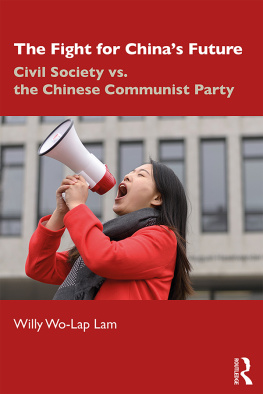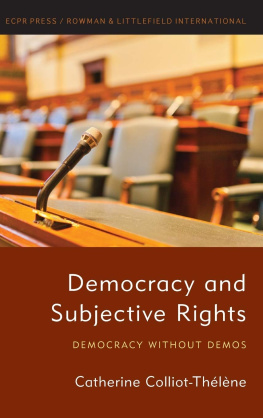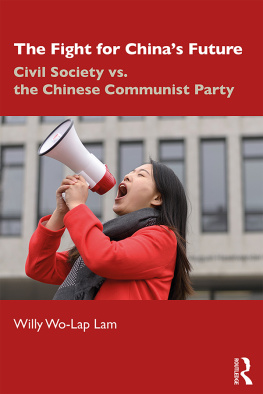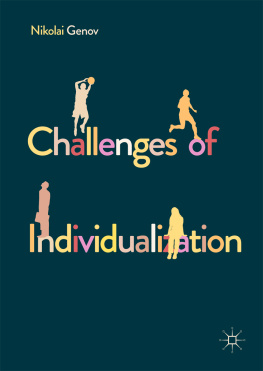THE INDIVIDUALIZATION OF CHINESE SOCIETY
LONDON SCHOOL OF ECONOMICS MONOGRAPHS ON SOCIAL ANTHROPOLOGY
Managing Editor: Charles Stafford
The Monographs on Social Anthropology were established in 1940 and aim to publish results of modern anthropological research of priman interest to specialists.
The continuation of the series was made possible by a grant in aid from the Wenner-Gren Foundation for Anthropological Research and more recently by a further grant from the Governors of the London School of Economics and Political Science. Income from sales is returned to a revolving fund to assist further publications.
The Monographs are under the direction of an Editorial Board associated with the Department of Anthropology of the London School of Economics and Political Science.
THE INDIVIDUALIZATION OF CHINESE SOCIETY
YUNXIANGYAN
LONDON SCHOOL OF ECONOMICS MONOGRAPHS ON SOCIAL ANTHROPOLOGY
Volume
First published 2009 by Berg Publishers
Published 2020 by Routledge
2 Park Square, Milton Park, Abingdon, Oxon OX14 4RN
605 Third Avenue, New York, NY 10017
Routledge is an imprint of the Taylor & Francis Group, an informa business
Copyright London School ofEconomics 2009
All rights reserved. No part of this book may be reprinted or reproduced or utilised in any form or by any electronic, mechanical, or other means, now known or hereafter invented, including photocopying and recording, or in any information storage or retrieval system, without permission in writing from the publishers.
Notice:
Product or corporate names may be trademarks or registered trademarks, and are used only for identification and explanation without intent to infringe.
Library of Congress Cataloging-in-Publication Data
A catalogue record for this book is available from the Library of Congress.
British Library Cataloguing-in-Publication Data
A catalogue record for this book is available from the British Library.
ISBN13: 978-1-8478-8378-0 (pbk)
Typeset by SAGE India.
In fond memory of Professor Kwang-chih Chang (1931-2001)
a wonderful mentor and role model
During the four years of compiling this collection of essays. I have been deeply indebted to Charles Stafford, Managing Editor of the LSE Monographs on Social Anthropology, for his encouragement, patience, and untiring help, without which I would have abandoned the effort on at least two occasions. I am grateful to Stephan Feuchtwang, Arthur Kleinman, and James L. Watson for their valuable comments and advice; additional thanks go to Arthur for writing the Foreword. I am also grateful to the original publishers, who are credited in the permissions list at the end of this book, for allowing the reproduction of the essays. Nancy Hearst provided wonderful editorial assistance on many of the essays in this collection; once again. I relied on her magical skills for the two new chapters as well as for proofreading the manuscript. Professor Kwang-chih Chang's advice in 1986 was one of the crucial factors that enabled me to change from the study of Chinese literature to social anthropology. He played a key role in my early years of training at Harvard University and remains a role model for me now; hence, I dedicate this volume to his memory. Finally, I owe a special thanks to my wife Betty for being my most loyal critic and soul-mate.
The author of the essays in this book, Yunxiang Yan, has lived an extraordinary life. He has been a shepherd and village storyteller in North China, an undergraduate student at Peking University, a graduate student at Harvard, and professor of anthropology at UCLA. Along the way, he has written a classic ethnographic account of gift-giving and receiving in the North China village where he lived during the frenzy of the Cultural Revolution and to which he returned to study decades later. This is complemented by a more recent study of the large emotional, relational and behavioral changes in that same village under the greatly inf uential impact of the economic reforms that have taken place since the late 1970s.
The individual chapters of this book which depict changes in economic and social stratif cation, power, family relationships, wider kinship ties, household economy, marriage, youth culture, women's status, consumerism, and the emergence of individualism document a great transformation in everyday life that is remaking China and the Chinese. That transformation, Yan avers, can be seen in Xiajia village and among its inhabitants, with whom Yan has lived for much longer than the usual one- or two-year ethnographic sojourn, and whose new everyday social reality, he goes on to propose, is a microcosm of what is taking place in China more generally. At its base is a shift in moral coordinates and experiences. The lived values that, on a daily basis, recreate Chinese culture in relationships, exchanges, institutions and rituals, and also in the subjective interior of personhood. are undergoing a tectonic movement which in turn is shaking and shifting the social world toward something new and different. Patriarchy is no longer so prevalent, though it has not disappeared entirely; f lial reverence is losing its priority status and being replaced by the new centrality of conjugal ties and youth culture; the social status hierarchy legitimated by radical Maoism is being replaced by a new one created by the market economy and globalization; and social inequality is being reconstituted and deepened.
Most telling, Yan shows us that the Chinese culture of today is witnessing and fostering a new individualism that openly expresses aspects that were both unspoken and underdeveloped, and even politically disallowed, in past eras. That new stream of individualistic orientation and self-fashioning brings with it to the fore the material desires and practices of consumerism. It also brings an egocentric pragmatism in personal relationships that alters ties long considered to be based in cultural ethics toward a troubling "you-scratch-my-back-I-scratch-yours" pattern that can propel corruption, and a new sense of what constitutes a good life and what is thought to be good in general. Chinese society, of course, has always had a place for the individual but, in the past, that place was less aggressively pursued in public and more sociocentric in its expression. So Yan demonstrates that the self and personhood of Chinese are becoming different just as their local moral worlds are transiting to something new. That new reality, for Yan, is both troubling and hopeful.
As a chronicler of the times, Yan contributes an admirable combination of situated ethnographic detail, penetrating anthropological analysis and thoughtful marshaling of relevant and illuminating social theory. He also suggests telling comparisons with the China of earlier and different times, as well as comparisons with the West. Indeed, the cross-cultural comparisons that Yan's f ne-grained descriptions and well-grounded interpretations enable go to the heart of contemporary concerns about understanding what is most at stake in our times and how it is changing who we are. Yan's chapters, then, help us not only to think about China and the Chinese, but also about America and the Americans, the West and Westerners.









